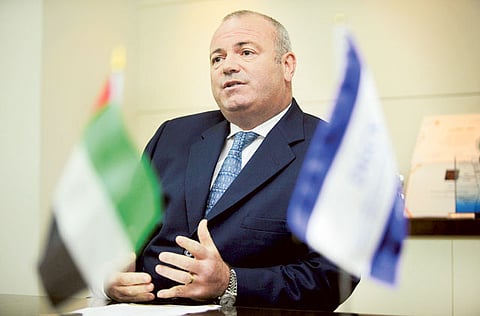DGCX sees a fine option in rupee futures
Gold Futures recor 47 per cent growth in the first quarter compared to the same period last year

Dubai: Dubai Gold and Commodities Exchange (DGCX) has launched a Indian Rupees Futures Contract of a much smaller size that would now allow retail participants to access the futures market and hedge their risks.
Called the Mini Indian Rupees Futures Contract, it is one-tenth of the current size of the INR Futures Contract, which stands at Rs2 million per lot, equivalent to around $37,000. The Mini Contract is only Rs200,000 per lot and is expected to expand the already record performing INR Futures Contract.
“In terms of the people we are looking to attract is predominantly the retail sector and a lot of High Net Worth Individuals, as well, that may need to use this product to access some of their exposure against the [US] dollar,” said Gary Anderson, chief executive of DGCX in an exclusive interview with Gulf News. “Also, [we aim to attract] some of the smaller companies, the jewellers, the refiners that need to hedge their risk on the exchange. The Mini INR being a smaller contract will enable them to do that without taking too much risk.”
The DGCX first quarter of 2013 volumes rose 112 per cent from first quarter of 2012, while volumes in March 2013 surged 95 per cent from the same month last year. And DGCX Indian Rupee Futures have traded 3,024,090 contracts in the first quarter of this year registering a growth of 116 per cent over last year.
“So what we have here is the Indian rupee contract, which one of our star performers this past 12 months and is responsible for majority of the volume that goes through,” said Anderson. “In addition, we have the gold futures contract, which has been very active this past year.”
In its efforts to launch products such as Futures of S&P BSE Sensex, MSCI India Index, Spot Gold and Plastics, the Dubai exchange is trying to become the offshore emerging markets’ centre of choice to not just list contracts outside of the GCC, but to try and bring products to the exchange that facilitate what goes here within the GCC and Dubai, in particular.
“We have been looking at Spot Gold for quite some time and it’s now coming to fruition,” he said. “A Spot Gold market would certainly fit into that gold system and also would be a complement to the [existing] structure itself.”
The existing Gold Future is a kilo contract in size. DGCX Gold Futures recorded 47 per cent growth in the first quarter compared to the same period last year. DGCX plans to launch the Spot Gold Futures Contract in the third quarter this year, said Anderson, during a wide ranging conversation at his office last week.
“And in terms of the Gold Futures contract itself, we are probably now doing somewhere between 2-1/2 and 3 tons of gold everyday. And that actually is quite a significant amount and if you look globally, DGCX is one of the top 10 exchanges for trading gold. And our silver contract is also improving as well. In that sense, precious metals is again a very important part of our strategy for the exchange going forward.”
Following Spot Gold Futures Contract in the third quarter will be Plastics Futures Contract, which the regional and global players have been demanding for some time. The GCC is a big provider of plastics — 22 per cent to 25 per cent globally — and a lot of it is exported into the Chinese markets. Last year DGCX had signed an MoU with the Dalian Exchange which has a petrochemicals-plastics contract as well. They are the only one that has a liquid contract.
“We have been working very closely with them this last nine months and so, what we are looking to do is to introduce a another contract [plastics],” said Anderson. “We believe that if we can somehow combine the two, in terms of liquidity it ill be a huge benefit not just to what’s going on in China but also in the Middle East and rest of the world as well.”
Box:
Now that the Indian Rupee Futures Contract, with a size of Rs200,000, is open to retail segment, what about the risks?
“Trading futures is only risky if you are speculating,” said Gary Anderson, chief executive of DGCX. The majority of our members within the region use it as a hedge against their underlying exposure and primarily that is gold itself. So we do see a lot of the jewellers, refiners, and the wholesalers participate on DGCX to hedge their risk, and given the volatility, the selloff we had in the past week, futures is a good way of minimising your risk and exposure to that.” Educating the members and end-users is probably the most crucial thing in futures business. DGCX realises that and has started an academy nine months ago. It has been working closely with some of the banks, with their membership and the Gold Souq as well. “ We have done some workshops and master classes on how to utilise futures to hedge gold in particular. So we do that and we need to do more of that. In particular we need to do more across the GCC,” Anderson said. in particular because as a refiner you are refining gold on a daily basis — that last four five days we have seen gold drop a $100. So the transaction you made one week ago, is $100 below of where it was then. So the ability to sell futures is a positive thing. There is always a risk in trading. But if you are hedging, it will reduce your risk overall.
Sign up for the Daily Briefing
Get the latest news and updates straight to your inbox



